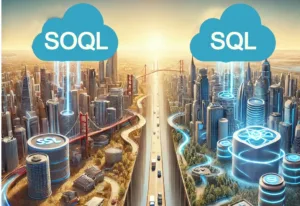Salesforce professionals often working with data come to understand SQL vs SOQL. While both are used to query data, they serve different distinct purposes. This blog will help you understand SQL (Structured Query Language) vs SOQL (Salesforce Object Query Language) in relation to Salesforce.
SQL: A universal query language used across various relational databases (e.g., MySQL, PostgreSQL, Microsoft SQL Server, Oracle, Snowflake). SQL in this context of this article focuses on “data query language” which is intended to query data out of a database. Its important to note that SQL encapsulates creation and management of database objects and inserting, updating, and deleting records in a database.
SOQL: A Salesforce-specific data query language used only to retrieve records from Salesforce objects.
Key Differences for SQL vs SOQL
| Feature | SQL (Standard Query Language) | SOQL (Salesforce Object Query Language) |
|---|---|---|
| Usage | Query and manage relational database data. | Query Salesforce objects. |
| Database | Works with structured tables in databases like Snowflake, MySQL, etc. | Works with Salesforce records stored in Objects (like tables). |
| Joins | Supports multiple table joins (INNER, LEFT, RIGHT, FULL). | Supports only parent-to-child and child-to-parent relationships (limited JOINs). |
| Aggregation | Uses GROUP BY, HAVING, and aggregate functions (SUM, AVG, COUNT). | Uses GROUP BY and HAVING, but with limited aggregate functions. |
| Filtering | Uses WHERE with multiple conditions and operators (LIKE, IN, BETWEEN). | Uses WHERE but does not support LIKE for wildcard searches. |
| Ordering | ORDER BY (Multiple fields with ASC/DESC). | ORDER BY (Only one field allowed). |
| Subqueries | Fully supports subqueries (SELECT ... FROM ... WHERE ...). | Supports limited subqueries, mainly in WHERE clause. |
| DML (Data Manipulation Language) | Can INSERT, UPDATE, DELETE records. | SOQL only retrieves data. (For DML, use DML operations in Apex). |
| DDL (Data Definition Language) | Can CREATE, ALTER, DROP objects like databases, schemas and tables. | SOQL only retrieves data. |
| Relationships | Uses JOIN to retrieve related data from multiple tables. | Uses dot notation (.) to retrieve related objects (parent-child). |
| Permissions | Access control depends on database roles and privileges. | Respects Salesforce security rules (sharing settings, profiles, FLS). |
3. Example Queries
Basic SQL Query
SELECT first_name, last_name, email
FROM customers
WHERE city = 'San Francisco'
ORDER BY last_name;
Equivalent SOQL Query
SELECT FirstName, LastName, EmailFROM Contact
WHERE MailingCity = 'San Francisco'
ORDER BY LastName;4. Joins vs. Relationships
SQL JOIN (Multiple Tables)
SELECT orders.order_id, customers.name
FROM orders
JOIN customers ON orders.customer_id = customers.customer_id;- SQL supports multiple joins between different tables.
SOQL Parent-Child Query (One Level)
SELECT Name, (SELECT Name FROM Opportunities)FROM Account;- SOQL only allows pre-defined relationships between Salesforce objects (e.g., Account → Opportunity).
When to Use SQL vs SOQL
| Scenario | Use SQL | Use SOQL |
|---|---|---|
| Querying Salesforce data inside Salesforce. | ❌ | ✅ |
| Querying data from an external database (e.g., Snowflake, MySQL). | ✅ | ❌ |
| Running complex joins across multiple objects. | ✅ | ❌ (Limited to parent-child relationships). |
Performing updates (UPDATE, DELETE, etc.). | ✅ | ❌ (Use DML in Apex). |
Filtering records using advanced conditions (LIKE, IN, BETWEEN). | ✅ | ❌ (Limited in SOQL). |
| Reporting and exporting Salesforce data. | ✅ (via integrations) | ✅ (Direct SOQL queries). |
SQL for Salesforce (Requires external Database)
- Salesforce data can be exported to external databases and data warehouses like Snowflake (or other databases) using ETL tools like:
- Salesforce Connect
- Salesforce DataCloud integrations
- Snowflake Data Sharing
- Tools like Azure DataFactory, MuleSoft, Talend, Fivetran
- Once in Snowflake, SQL queries can be used for advanced analytics and reporting. Salesforce admins, developers and analysts benefit from learning SQL because it expands the ability to work with Salesforce data in other applciations including but not limited to Salesforce Marketing Cloud, Datawarehouses like Snowflake
Learn more about SOQL
Free Tutorial: Master SOQL for Salesforce
Learn more about SOQL
Learning Course: Learn SQL for Salesforce

